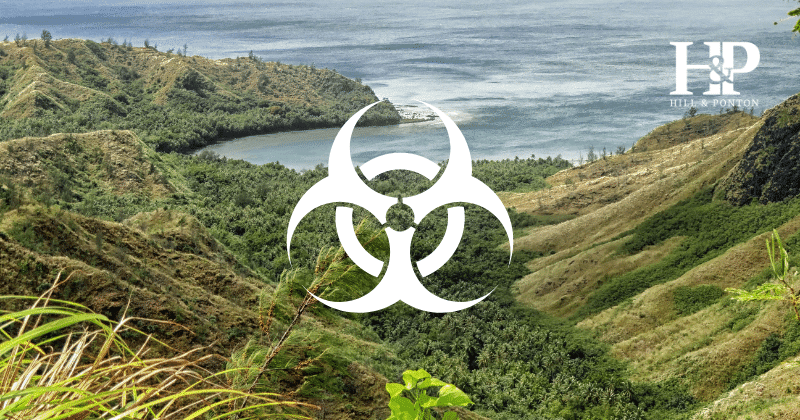Agent Orange, a herbicide widely used during the Vietnam War, has left a lasting impact on veterans who came into contact with it. Though commonly associated with Vietnam, Agent Orange was also utilized in other regions, including Guam and American Samoa.
The use of Agent Orange and other herbicides in Guam occurred from the 1950s through the 1970s, primarily for controlling vegetation around U.S. military bases. These activities were part of broader efforts to maintain security and operational readiness.
Significant research, including a comprehensive report from Yale Law School, has verified the presence of dioxin—a toxic component of herbicides—in Guam’s environment.
Health Impacts of Herbicide Exposure
Exposure to herbicides is linked to numerous serious health conditions due to its dioxin content. These conditions include:
- AL Amyloidosis: a rare condition where amyloid proteins unwillingly enter the body tissues and organs.
- Bladder Cancer: a type of cancer impacting the bladder and surrounding areas that are important in removing urine from the body.
- Chronic B-cell Leukemia: A type of white blood cell cancer that includes all B-cell leukemias and hairy-cell leukemias and chronic lymphocytic leukemia.
- Chloracne: A type of skin condition that occurs shortly after exposure to certain chemicals and resembles acne. The VA requires it must be at least 10% disabling within one year of exposure to the chemical.
- Diabetes Mellitus Type 2: When there is high blood sugar levels within the body and an inability to appropriately respond to the insulin hormone.
- Hypertension: High blood pressure
- Hodgkin’s Disease: A type of lymphoma that is malignant (cancerous) and is characterized by enlargement of lymph nodes, liver and spleen.
- Hypothyroidism: A condition of the thyroid gland that prevents it from producing certain types of hormones.
- Ischemic Heart Disease: A disease that occurs when the blood supply to the heart is decreased and will lead to chest pain.
- Monoclonal gammopathy of undetermined significance (MGUS)
- Multiple Myeloma: A white-blood cell cancer that impacts plasma cells specifically, that reside in bone marrow.
- Non-Hodgkin’s Lymphoma: A variety of cancers that will impact various parts of the lymphatic system, like tissue and lymph nodes/glands.
- Parkinsonism: Any condition that results in the body moving abnormally (muscle tremors, stiff muscles, speech issues, slow/irregular movements).
- Parkinson’s Disease: A progressive disease that impacts the central nervous system (CNS) and an individual’s muscle movements.
- Peripheral Neuropathy, Early-Onset: A nervous system condition that often results in weakness, numbness or tingling in various extremities. The VA states that this must be at least 10% disabling within one year of exposure to an herbicide.
- Porphyria Cutanea Tarda: A disorder that causes dysfunction of the liver and surrounding tissue and thinning/blistering of the skin. The VA requires this disease must be 10% disabling within one year of being exposed to an herbicide.
- Prostate Cancer: One of the most common cancers in men, impacting the prostate.
- Respiratory Cancers: Any cancer that impacts the lungs, larynx, trachea or bronchus.
- Soft Tissue Sarcomas: Types of cancers that impact body tissues like muscle, fat, blood and lymph vessels. Note: the VA excludes osteosarcoma, chondrosarcoma, Kaposi’s sarcoma and mesothelioma from this list.
Is Guam Included Under the PACT Act?
The Honoring Our PACT Act (PACT Act) extends healthcare and benefits to veterans exposed to toxic substances, including those in Guam.
Anyone stationed on Guam from January 9, 1962 through July 31, 1980 is now considered to have been exposed to Agent Orange. The act also includes American Samoa and their territorial waters from January 9, 1962 to July 31, 1980.
The act acknowledges the exposure of veterans to herbicides like Agent Orange and facilitates access to necessary healthcare and benefits.
Steps to Apply for Benefits
Veterans who were exposed to Agent Orange and other herbicides can follow these steps to apply for VA benefits:
- Document Gathering: Collect service records, medical records, and other relevant documents that demonstrate service in Guam/American Samoa and exposure to herbicides.
- Submitting a Claim: File a claim through the VA, either online, by mail, or in person at a VA office.
- Undergo a Medical Examination: The VA may require a medical exam to confirm the link between health conditions and Agent Orange exposure.
- VA Decision: The VA will review the submitted evidence and issue a decision. If approved, veterans will receive compensation and benefits. If denied, you have the right to appeal. Our Agent Orange lawyers may be able to help.


